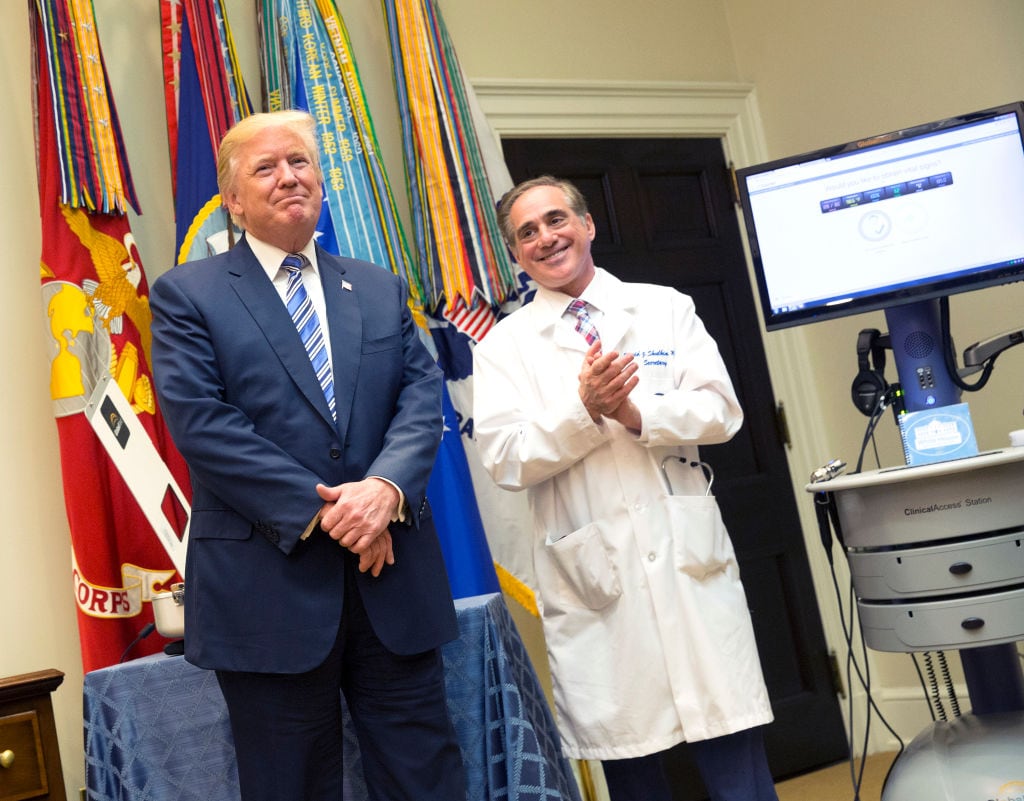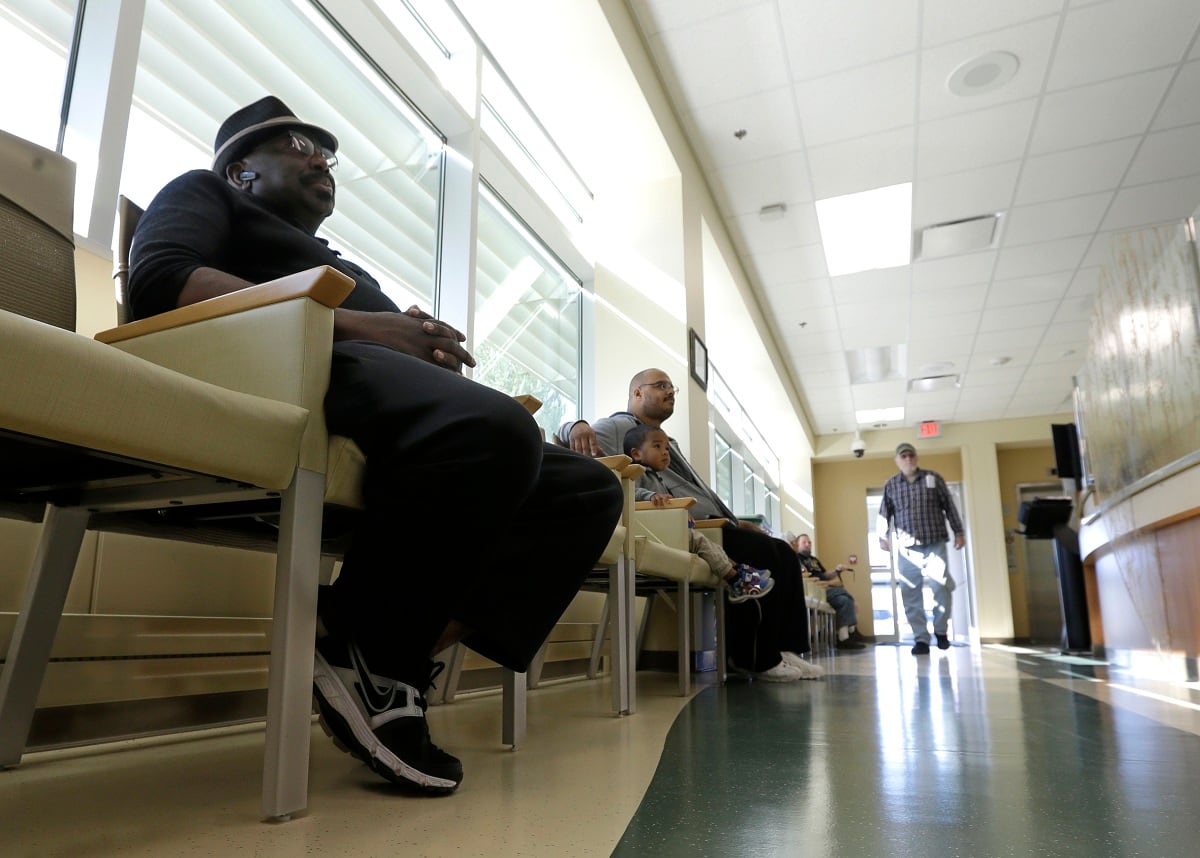WASHINGTON — Plans to overhaul the Veterans Affairs medical records system, one of President Donald Trump’s most touted achievements last year, may be on the verge of collapse because of the leadership upheaval at the department in recent weeks.
Multiple sources close to work on the issue say White House officials are wavering on whether to move ahead on contract plans with the Missouri-based Cerner Corp. to bring VA’s electronic medical records systems in line with the Defense Department.
Meanwhile, the department’s new chief technology official — just appointed this week — is facing heavy criticism for a lawsuit accusing him of sexual harassment while he was working for Trump‘s presidential campaign, calling into question whether he can shepherd the deal to completion.
The controversies cast a pall over the ambitious medical records plan, expected to take more than a decade and upwards of $16 billion to implement. Last summer, Trump touted the agreement as a victory for veterans and proof that his administration could cut through Washington bureaucracy to provide better services for all Americans.
Former VA Secretary David Shulkin, who unveiled the plan in a highly hyped press conference last June, had said he expected contract negotiations to be completed by last fall, then by early 2018. He also said publicly he was close to finalizing the deal in the days before his firing by Trump last month.
Now, both Cerner and administration officials are mum on when a new deal will be signed, if at all. Cerner referred all questions on the matter to VA leadership.
When asked for the current status of the deal, VA spokesman Curt Cashour said the department “doesn’t typically comment on ongoing negotiations.” When asked if the department is still committed to adopting the same health records platform as the Defense Department, he gave the same reply.
But Cashour did say the firing of Shulkin has not affected work on the issue.
The VA’s electronic health records systems have been a point of contention for years, with lawmakers repeatedly questioning why the department and Pentagon cannot better share troop’s medical information.
In 2009, then President Barack Obama made promises similar to Trump’s to modernize both department’s medical records and provide seamless transition for troops leaving the ranks.
But in the ensuing years, VA has spent more than $1 billion to make its legacy health record systems work better with military systems, with mixed success. The new VA-Cerner contract would have put veterans records on the military’s new MHS GENESIS records system, which is currently being installed at military health facilities.
Administration and Cerner officials have quarrelled behind the scenes over intellectual property rights and universal compatibility issues with the VA contract, but department officials had downplayed those in recent months as technical discussions that did not endanger the deal.
In early March, in testimony before the House Appropriations Committee, Shulkin said he was confident the work would be completed soon and would have widespread benefits “not only for veterans but across the country for all Americans.” He believed the new records system could serve as a standard for nationwide electronic health records, breaking down proprietary barriers that health experts have long lamented.
“I believe we will soon be at a contract that will be groundbreaking for new rules in interoperability,” he said. “We’ve gotten 11 major hospital systems to sign on to a pledge that they will adhere to open (application program interfaces) and industry standards. And more and more health systems will want to work with veterans.”

Scott Blackburn, VA’s acting executive for the Office of Information and Technology, had been working on finalizing the contract with Shulkin in recent months. He left the post this week, and was replaced by Camilo Sandoval, the former data operations director for Trump’s presidential campaign.
Sandoval’s appointment is temporary, but has already drawn strong reactions from lawmakers on Capitol Hill. On Wednesday, Politico reported that another former Trump campaign staffer filed a lawsuit against Sandoval in November charging he sexually harassed and discriminated against her while the two worked to get Trump into the White House.
“President Trump’s naming of a profoundly inexperienced campaign staffer accused of sexual harassment to serve as VA’s Chief Information Officer is disturbing, unacceptable, and another sad illustration of this administration’s disregard for our nation’s veterans,” said Rep. Tim Walz, D-Minn., and ranking member of the House Veterans’ Affairs Committee.
“At a time of implementation of critical VA initiatives, such as the modernization of VA’s electronic health record system and confronting an aging IT infrastructure, this is a profoundly bad decision that disrespects those who have worn our nation’s uniform.”
Fellow committee member Rep. Ann Kuster, D-N.H., similarly called for Trump to remove Sandoval, who was also among a group of political operatives in the administration that Shulkin accused of undermining his tenure at VA.
RELATED

The medical records issue is expected to be among the topics that VA Secretary nominee Ronny Jackson faces at his confirmation hearing before the Senate Veterans’ Affairs Committee on April 25. Jackson, who currently serves as the White House physician, has not made any public comments on the matter thus far.
Meanwhile, Trump named Under Secretary of Defense for Personnel and Readiness Robert Wilkie as the new acting VA secretary during Jackson’s confirmation process. White House officials have not said whether he’ll have the authority to move ahead with the Cerner negotiations during that time.
The department has been without a permanent under secretary for health since February 2017, when Shulkin was promoted from that spot to the top VA post, and without a permanent chief information officer since January 2017, when LaVerne Council stepped down during the presidential transition.
Cashour said a candidate for the latter post has been identified and is being vetted by the White House.
Leo covers Congress, Veterans Affairs and the White House for Military Times. He has covered Washington, D.C. since 2004, focusing on military personnel and veterans policies. His work has earned numerous honors, including a 2009 Polk award, a 2010 National Headliner Award, the IAVA Leadership in Journalism award and the VFW News Media award.




